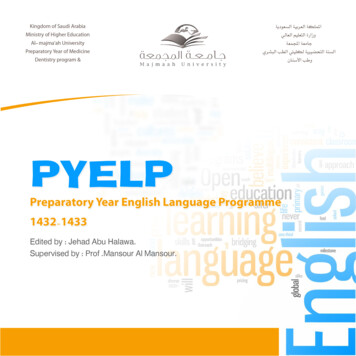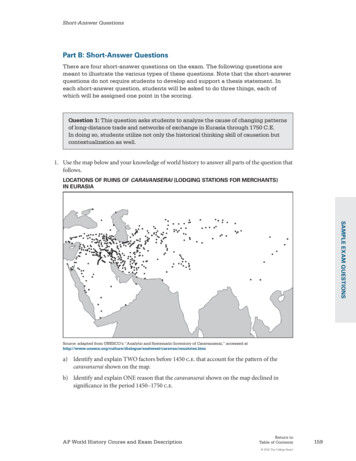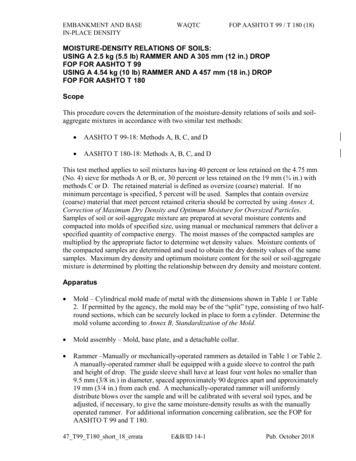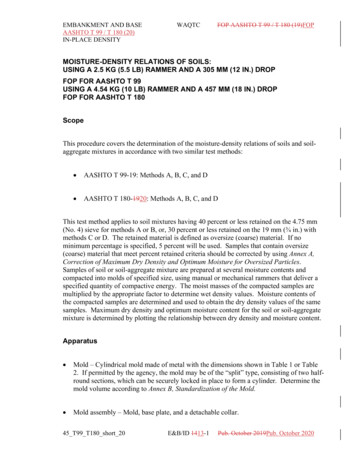
Transcription
NUM nìÉëíáçåë båèìáêáÉë Äçìí fëä ã sçäìãÉ låÉW qÜÉ éê ÅíáÅ ä ä ïë Extracted from the Writings of yatull{h al- U m{ «{jj Shaykh N{#ir Mak{rim Sh r{z Compiled by Sayyid Husain HusainiTranslated by Shahnawaz Mahdavi
British Library Cataloguing-in-Publication DataA catalogue record for this book is available from the British LibraryISBN 1-898449-84-8 Copyright 2005 the World Federation of KSIMCPublished byThe Islamic Education Board of theWorld Federation of Khoja Shia Ithna-Asheri Muslim CommunitiesRegistered Charity in the UK No. 282303Islamic Centre - Wood LaneStanmore, Middlesex, United Kingdom, HA7 eb@world-federation.orgCanada Sales and DistributionDistributionIsl{mic Humanitarian Service · 81 Hollinger Crescent · Kitchener, OntarioCanada, N2K 2Y8 · Tel: 519-576-7111 · Fax: 519-576-8378ihs@primus.ca · www.alwww.al-haqq.comUSA Sales and DistributionDarul Tabligh North America · 786 Summa Avenue · Westbury, NYUSA, 11590 · Tel: 516-334-2479 · Fax: 516-334-2624www.darultabligh.org · info@darultabligh.orgAfrica Sales & DistributionTabligh Sub Committtee - K.S.I. Jam{ at – Dar Es Salaam · P.O. Box 233Dar es Salaam, Tanzania · Tel: 255-22-211-5119 · Fax: 255-22-211-3107tabligh@raha.comtabligh@raha.com · www.dartabligh.orgAll rights reserved. No part of this publication may be reproduced, stored in aretrieval system, or transmitted in any form or by any means, electronic,mechanical, photocopying, recording, or otherwise, without the prior writtenpermission of the copyright holder, except in the case of brief quotationsquoted in articles or reviews.Printed in CanadaBy Friesens Corporation – www.friesens.com
TABLE OF CONTENTSA few words about this book by Ayatullah al-Uzma Makarim Shirazi . viivii.Biography of Ayatullah al-Uzma Makarim Shirazi. ixIntroduction. 19The Prayers . 231.What is the philosophy behind Wu } and Ghusl?.23Philosophy of GhuslGhusl . 242. What is the philosophy behind Tayammum?.263. What is the manner of washing the face, and wiping the head andthe feet in Wu }? .284. What is the need to face the Qiblah in prayers? .305. What secrets lay behind the changing of the Qiblah? .316. What is the philosophy of prayers? .337. Why should we offer prayers at prescribed times?.42FastingFasting . 458. What is the philosophy of fasting?.45The social effects of fasting . 47The medical and curing effects of fasting . 48Khums.Khums . 519. Is allocation of one half of Khums for the Bani H{shim notfavouritism? .51Zak{Zak{t . 5510. What is the philosophy behind (the payment) of Zak{t?.55«ajj.«ajj . 5911. What is the secret and philosophy of «ajj? .591. The Ethical Dimension .592. The Political Dimension .603. The Cultural Dimension .62
4. The financial dimension.63«ajj - An important worship for human development.66Jih{dJih{d . 6912. What purpose does Islam seek to achieve by Jih{d? What is theneed for the ‘Initiating Jih{d’? .691 – The ‘Initiating’ and ‘Liberating’ Jih{d .692 – The ‘Defensive’ Jih{d.693 – Jih{d for the ‘Eradication Of Polytheism And Idolatry’ .7013. How does Islam attest slavery?.72Islam’s strategy for liberating slaves .72The first part: Eliminating the sources of slavery .73The second part: Opening the door towards freedom .74The main points of this program:.7414. What is Jizyah and what is its philosophy? .7715. What is the philosophy behind the prohibition of battles in theHoly Months?.81The Rights Of Women In Islam.Islam . 8316. What rights does Islam offer to the women? .83One should not err with respect to the meaning Of ‘equality’ .86The spiritual worth of man and woman.8717. What is the philosophy of «ij{b?.88Criticisms levelled by the opponents of ¡ij{b .9318. Why is the inheritance of men twice that of women?.96Explanation.9619. Why is blood money for women half that for men? .98Explanation.9920. What is the philosophy behind the dower for women? .9921. How does Islam permit the physical punishment of women? .102
22. Why are men permitted to have more than one spouse whereasthe women are not? .10423. What is meant by ‘justice’ as mentioned in the conditions (to beconsidered) with respect to polygamy? .11024. What is the philosophy behind temporary marriage? .113Criticisms levelled against temporary marriage.114Russell and temporary marriage .11625. Did temporary marriage exist during the time of the NobleProphet ?.11726. What is the philosophy behind Muhallil?.12327. What is the philosophy behind the observance of Iddah? .125 Iddah - A means for reconciliation and return.126 Iddah - A means to protect the generation.127PhilosophyIslam .129.129hilosophy behind some of the prohibited acts of Islam28. What is the philosophy behind the prohibition of gambling? .129Gambling - The Premier cause of agitation and excitement.129Connection between crime and gambling .130The economic harms of gambling .130The social harms of gambling .13029. What is music and what is the philosophy behind prohibition? 131Are all pleasant and melodious sounds music?.131The philosophy behind the prohibition of music .1331. Encouragement towards moral degradation.133Music – one of the tools of the colonialists.13530. What is the philosophy behind the prohibition of fornication?.13631. What philosophy governs the prohibition of homosexuality? .13832. What is the philosophy behind the prohibition of (consumptionof) liquor? .140Effects of alcohol upon age .140
The effects of alcohol upon the offspring .141Effects of alcohol upon the morals .141The social harms of alcohol .142The economic harms of alcoholic drinks .14233. What is the philosophy that governs the prohibition of(consumption of) pork?.14534. What is the philosophy behind the prohibition of sexualintercourse during menstruation?.14635. What is the philosophy for the prohibition of marriage with one’s‘immediate relatives’? .148The Noble Qur {Qur {n .155.15536. Has the Qur an been altered? .15537. How is the Qur an a miracle?.15838. Is the miracle of the Qur an confined to its eloquence only? .16439. How do we know they have not brought the like of the Qur an?16740. What do al-«ur}f al-Muqatt ah (The Broken Letters) of the Qur anmean? .16941. Has the Qur an attested the contents of the Torah and theGospels? .17542. Was the Qur an collected during the time of the Noble Prophet or after him? .177ONE QUESTION .17943. What are the ‘clear’ and the ‘ambiguous’ verses? .18044. Why are some of the verses of the Qur an ambiguous?.18445. Is Bismill{h a part of (every) chapter? .18746. Why is it forbidden to give the Qur an to a disbeliever? .191
TRANSLITERATION TABLEThe method of transliteration of Islamic terminology from the Arabiclanguage has been carried out according to the standard transliterationtable mentioned below. ab t thghjf¡khddhrzssh qklmnwyh#Short VowelsLong Vowels {} ـــَـــ ـــُـــ ـــِـــ i - Free from Imperfections and Exalted is He - Prayers be upon him and his family - Peace be upon him - Peace be upon heraui
MIn the Name of All{h, the Most Gracious, the Most MercifulA FEW WORDS ABOUT THIS BOOK BYAYATULLAH AL-UZMA MAKARIM SHIRAZIa key to the treasures of humanknowledge, and individuals and nations who tend to question lesscome to acquire a reduced share from this vast treasure. Basically, itis the right of every person to ask questions and obtain theiranswers, and none can be deprived of this logical and rationalprivilege.QUESTIONS HAVE ALWAYS BEENThe Noble Qur an has repeatedly emphasized this aspect - ask those,who possess knowledge, about that of which you do not possessknowledge. '6 % ;" 98 : 5" 764"30 / 2, 1, 0/ -, . ) *( '% & #" ! The extensiveness of this Qur’anic ruling reveals that Islam does notrecognize any limits or restrictions as far as the issue of‘questioning’ is concerned, and permits the Muslims and even thenon-Muslims (despite appearing to be general in meaning, thisverse, in reality is addressed to the non-Muslims) to pose every kindof question, including those pertaining to various doctrinal, social,ethical and political issues, to those who have knowledge aboutthem.Exceptions to this rule are misleading questions asked with theintention of spoiling people’s faith, distorting constructive ideas,fermenting disturbance and confusion in the minds of the public,
Forewordmere wrangling, baseless arguments, obstinacy and prejudice. Inreality, these are not questions but destructive inhumane plots inthe guise of questions.In any case, since the Noble Qur an is a colossal encyclopaedia ofdivine sciences and human affairs, on numerous occasions and inconnection with various verses, there are questions that come tothe fore - a great number of which, due to lack of applicability inthose periods, have remained unanswered in the books of pastcommentators.While writing Tafs r-e-Nam}nah (with the assistance of someaccomplished scholars), we strived to propound all these questions especially those related to present-day issues - and to answer themin detail.Since it appeared essential that everyone, especially the educatedyouths, possess the answers to these questions, «ujjatul Islam Aghae-«usain and a number of honourable scholars of the TheologicalSeminary of Qum - whose names appear in the introduction of thebook - exerted themselves greatly in extracting these questions andanswers from the 27 volumes of Tafs r-e-Nam}nah and 10 volumesof Pay{m-e-Qur an. Consequently, they accumulated one hundredand eighty important questions and expended great effort inimparting a systematic arrangement to them - may All{h accepttheir efforts.It is hoped that this collection creates a new opening for everyone especially the beloved Muslim youths – regarding issues pertainingto Islam and the Qur an, and serves as provision for all of us for theDay of Judgment.«awzah Ilmiyyah, QumNasir Makarim Shir{z viii
BIOGRAPHY OF YATULL AL- U M MAK RIM SH R Z THE EMINENT SCHOLAR, yatull{h al- U m{ Shaykh N{#ir Mak{rimSh r{z was born in the year 1924 in the city of Sh r{z in Iran into areligious family who were well known for their high level ofspirituality and noble ethical traits. His Eminence finished hiselementary school studies in Sh r{z, where his intelligence,excellent memory and eagerness to learn, made him amongst thebest students, often completing two years of studies in one year!The conditions which existed in Iran in those days obligated thisyoung man - who possessed such talent and aptitude - to choose thepath of university and use his gifts to attain a secular qualification.However, the hand of destiny, the blessings of the Merciful Lord andhis own secret desire to delve deeper into the teachings of Islam,drew this young man’s attention towards Islamic studies; Especiallybecause, since after the spring of 1941 (when Iran became embroiledin the 2nd World War), the regime’s restrictions relaxed and theIslamic Seminaries gained renewed popularity.HIS STUDIESHis Eminence started his formal Islamic studies at the age of 14 atMadreseh-ye gh{ Bab{kh{n-e Sh r{z, and within a short period oftime, he was able to complete the prerequisite preliminary studiessuch as morphology (#arf), Arabic grammar (na¡w), logic (man iq),exposition (bay{n), and rhetoric (bad ).He then turned his attention towards the fields of jurisprudence(fiqh) and principles of jurisprudence (u#}l al-fiqh) and once again,due to his exceptional abilities, he was able to finish the study of thecomplete levels of introductory and both the levels of theintermediate Islamic studies in just four years! During this time, agroup of students from the Islamic Seminary in Sh r{z were alsobenefiting from his classes.
Biography of the AuthorThe positive criticisms and personal opinions of His Eminenceconcerning the classes being held in Qum and also in relation to theneed for including extra information within the books that werebeing taught at the various Theological Seminaries hinted at thebright future which awaited him. Meanwhile in religious gatheringsin this city, his capabilities, genius, meticulousness and deepthought were witnessed by others and no one was able to deny hisAll{h-given talents.When this brilliant star was a mere 18 years old, through hispenetrating thought and versatile pen, he wrote a commentary onthe book Kif{yatu’l U#}l, in which he shed light on some ambiguousissues mentioned in this traditional work. At the age of 18, heformally entered the Theological Seminary of Qum and for the nextfive years, he attended the religious gatherings and classes of someof the greatest teachers of those days, such as Ayatull{h al- U m{Bur}jerd and other great personalities.In order for His Eminence to become better acquainted with theillustrious scholars who were studying and teaching in one of thegreatest Theological Seminaries of the Sh a, and to betterunderstand their ideas and thoughts, in the year 1950, he made hisway to the «awzatu’l Ilmiyyah of Najaf al-Ashraf in Iraq. It was herethat he was able to take part in the classes of some of the greatestteachers such as: yatull{h al- U m{ al-«ak m , yatull{h al U m{ al-Kh} and yatull{h al- U m{ Abdul H{d al-Sh r{z and others.At the age of 24, His Eminence was granted permission forindependent reasoning (ijtih{d) from two of the great scholars ofNajaf al-Ashraf. In addition, yatull{h al- U m{ al-«ak m wrote abrief foreword to His Eminence’s work, The Book of ah{rah.His acquisition of knowledge continued with the great teachers inNajaf until economical restraints forced him to leave this holy city,and return back to Iran in the year 1951. He chose to settle in theholy city of Qum, which in those days required religious scholars.x
180 Questions: Enquiries About Islam - Volume IOnce again, he joined the circle of scholars who later on, had aprofound impact on his life.After returning to Iran, yatull{h al- U m{ Mak{rim Sh r{z beganteaching the intermediate and higher level of studies (kh{rij) in u#}lal-fiqh and fiqh – and he has taught these classes for almost 28 yearsnow, benefiting a large number of students in the process.Furthermore, after teaching many of the important books of fiqh, hewent on to write summaries and notes of these great works. Atpresent, his sessions at the kh{rij level on u#}l are one of the mostpopular classes in the «awzatul Ilmiyyah of the Sh a and there areclose to 2,000 dedicated scholars and students who attend andbenefit from his lectures.From the time of his youth, he used to write books in various fieldsof Islamic studies such as theology, Islamic awareness and the issueof wil{yah (of the Ahlu’l Bait ). Later, he started to write on theexegesis of the Qur an, fiqh and u#}l al-fiqh and he is currentlyrecognized as one of the most important writers in the Muslimworld.POLITICAL ACTIVITIESHe played an active role in the events which culminated in theIslamic Revolution of Iran, and it is because of this that the Shahimprisoned him several times. He was exiled on three separateoccasions to the cities of Chabh{r, Mah{b{d and An{rak. After theRevolution, he was appointed to the first Council of Representatives(Majlis-e Khubrag{n) where he played an important role informulating the first constitution.HIS VALUABLE CONTRIBUTIONS yatull{h N{#ir Mak{rim Sh r{z has been very active in variousfields of teaching and guiding the upcoming scholars of theTheological Seminary of Qum, and has initiated various projects, ofwhich we will mention just a few:xi
Biography of the Author1. A Religious Publication of the Sh a Centre: For a long time, HisEminence felt the need for the «awzatu’l Ilmiyyah of Qum to have ageneral publication which would be able to defend the Sh a againstthe ever-growing works that were being published to misguidepeople.In addition, people had always expected this from the great Islamicseminaries and there was pressure from different parts of thecommunity, including the supreme religious authorities (mar{ja-yetaql d) of the «awza and others, to publish a magazine that wouldbe able to answer the religious enquiries of the youth and also tocounter the books and magazines that were misleading the people.Due to the fact that at that time, there were some intellectuals whowere not ready to accept such a publication, His Eminence soughtout serious and resourceful thinkers to shoulder the heavyresponsibility of producing such a publication. In this regard, HisEminence, along with a group of other scholars and the assistance ofthe leaders of the «awzatu’l Ilmiyyah of Qum and the financialsupport of well-wishers, launched the magazine, “Maktab-e-Islam”.This magazine was unprecedented in the Sh a world, and perhapsfrom the point of view of the range of its circulation, it is one of theleading religious magazines being published in the entire Muslimworld. This magazine gave a fresh and new path of direction to thegreat students and thinkers of the «awzah.At present, this publication is in its 39th year - offering its valuableservices to the Muslim world and the Sh a communities. It hasfound a special spot within the hearts of the youth, the universitystudents, teachers and other learned personalities and has spreadthe light of Islam and the Sh a school of thought from its centre(Qum) to the entire world.2. Organizing Gatherings to Offer Lessons in Theology and otherReligious Teachings: His Eminence felt that the classical works thathad been written in the field of Islamic Theology were no longersufficient with the passing of time, to address modern needs. Thexii
180 Questions: Enquiries About Islam - Volume Itraditional books of theology had been written in a century whenthe kind of problems we encounter today did not exist. The olderbooks discussed theological issues such as the disputes between theAsh arites and the Mu tazilites and other similar topics, which areno longer applicable today and which have become just of passinginterest only.Due to these facts, His Eminence, once again calling upon hisliterary talents and abilities, was able to present the subjects oftheological and principal beliefs in a novel and unprecedentedmanner. By organizing theological discussions, he made hundreds ofpeople conversant with these subjects, and he compiled thesummaries of these sessions in the form of books.3. Religious Council for the Protection of the Youth: In addition tosessions on theology, His Eminence organised other classes throughwhich his students were also instructed about the teachings of eightcurrent world religions so that they could engage in debates orcorrespond with the proponents of these faiths and counter theirbeliefs and ideologies.Within a short period of time, these classes were able to produceable students who were well informed in their specialized field ofstudy and today, an elite group of youth within the «awzatu’l Ilmiyyah, are busy studying these topics. Furthermore, in order tosafeguard the youth from the clutches of corruption, His Eminenceformed an organization called the Religious Council for theProtection of the Youth. One of the outcomes of this council was thepublication of material that was interesting to the youth, and thesequickly became established amongst the youth in the country.4. Struggles Against Eclectic Tendencies: On one of his trips to thecity of Sh r{z, His Eminence noticed that S}fism had gatheredpopular support. A group of people requested him to write a bookwhich would outline the principles of the S}f s – one that wouldexplain their beliefs in an agreeable and respectful manner. HisEminence, by making use of the resources available to him, wrotexiii
Biography of the Authorthis book in his usual style, and the book was printed in the year1953 CE with the title, Jalwa-ye «aq (The Manifestation of Truth).The style in which he wrote this book caught the attention of thelate yatull{h al- U m{ Bur}jerd and he requested His Eminenceto see him and congratulated him for his valuable efforts. In relationto this book, yatull{h al- U m{ Bur}jerd made the followingcommendation, “I have gone through this book in my spare timeand did not find even the smallest of weak points in it. May All{hreward you for your troubles.”5. Establishing Organizations and Centres of Learning: His Eminencehad made the intention of establishing such organizations in thesame number as the Ma #}m n , which is 14. By the grace ofAll{h, he has thus far been successful in establishing four suchimportant schools within the Theological Seminary of Qum and tworeligious organizations for the welfare of the students who areliving in the city of Mashad.6. Writings – The number of publications of His Eminence currentlylies at approximately 130 books which have all been printed – someof which have been reprinted more than 30 times and others whichhave been translated into more than 10 languages and have beenpublished in various parts of the world.The commentary of the Qur an authored by him, Tafs r-e-Namuneh(The Model Commentary) has been translated into many languages,including Arabic (al-Amth{l F Tafs r al-Qur an), and can be found inmany homes. An English commentary of the Qur an entitled, “Lightof the Holy Qur an” is also currently being published which islargely based on this work. In addition to this commentary, he hasalso authored a thematic commentary of the Qur an entitled,Pay{m-e-Qur an (The Message of the Qur an) in ten volumes. Thesetwo commentaries have opened up a new chapter in the field ofexegesis of the Noble Qur an.xiv
180 Questions: Enquiries About Islam - Volume IOne complete course in us}l al-d n has been covered in the firstseries of Pay{m-e-Qur an, while the author has recently embarkedon a second series covering ethics (akhl{q) in the Qur an. The firstvolume of this commentary has recently been translated intoEnglish and will be printed soon by the World Federation of KSIMC,based in the United Kingdom.In addition, the books he has written on theological beliefs haveably provided a defence for students and scholars against theonslaught of books containing false beliefs and untruths.Of the books of fiqh that he has written, we can mention thefollowing: Anw{r al-Fuqahah, al-Qaw{ idu’l Fiqhiyyah, Anw{r alU#}l and the notes and commentaries on the complete text of Urwat al-Wuthq{ which have been printed many times over.His practical guide for Muslims (Taw ¡ al-Mas{il) has also beenprinted many times and has also been translated into Arabic, Urdu,Turkish, Azari and English.A complete list of other publications of this great scholar whichhave been translated into English and are available is as follows.Most of these can be read on his website atwww.makaremshirawww.makaremshirazrazi.org.org1. Ethical Discourses [40 Lectures on Ethics and Morality] –Volume 1, 2 & 3 translated by Saleem Bhimji – published by theWorld Federation of KSIMC [www.world-federation.org]2. Khums: The Islamic Tax translated by Saleem Bhimji – publishedby the Islamic Humanitarian Service [www.al-haqq.com]3. Lessons in Islamic Beliefs – Taw¡ d, Ad{lah, Nubuwwah,Imamah, and Ma {d translated by Laleh Bakhtiyar – published byAnsariyan Publications [www.ansariyan.org]4. Life Under the Grace of Ethics translated by Monir Shafiei published by the Office of yatull{h Makarim Shirazi[www.makaremshirazi.org]xv
Biography of the Author5.
The Islamic Education Board of the World Federation of Khoja Shia Ithna-Asheri Muslim Communities Registered Charity in the UK No. 282303 Islamic Centre - Wood Lane . i - Free from Imperfections and Exalted is He Prayers be upon him and his family - Peace be upon him -
![Amalfi 180 Led Otto [28.01.22]](/img/23/022e99f7-d57e-51b4-8c41-152437a0d633.jpg)










